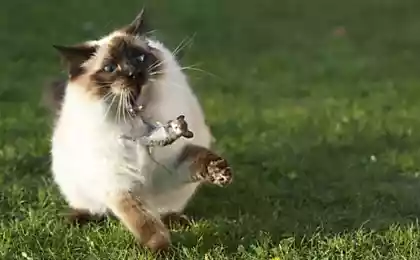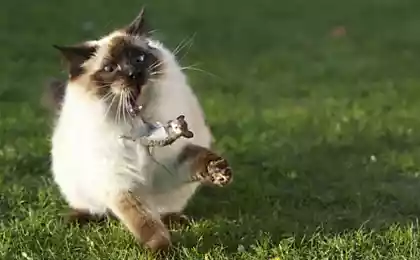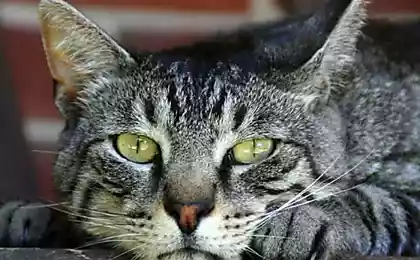572
Why cats are fastidious in food
Net hischnikiChuvstvitelnost two bitter taste receptors helped scientists to explain the excessive intelligibility many cats in the choice of food, reported in the journal BMC Neuroscience. Briefly about the research described in the blog publisher.
It is well known that cats have no sweet receptors. The researchers decided to appeal to the taste buds of bitter and conducted a series of experiments at the cellular level, figuring out how the two of them (Tas2r38, providing people hypersensitive and Tas2r43) responsive to bitter compounds. The scientists worked with well-known tasters phenylthiocarbamide (PTC) and propylthiouracil (PROP) - their molecular structure is approximately the same as that of Brussels sprouts and broccoli, as well as derived from the aloe and aloin Denatonium - the most bitter substance known to man. Denatonium often included in the composition of toxic drugs to prevent children and animals to eat them.

It turned out that the cat Tas2r38 ten times less sensitive to a PTC and did not react to the PROP. Tas2r43 also reacted to weaker aloin, and Denatonium - much stronger than the same receptor in humans. The researchers concluded that cats perceive bitter differently than men - they at least feel more limited number of bitter compounds.
This can be explained by the fact that cats, unlike dogs, primates and bears - pure predators, generally do not eat plants. Consequently, they do not need advanced bitter receptors that allow other animals to distinguish poisonous plants from the mineral. Side consequence - cats indifference to many types of food that a person appear to be tasty.
The researchers plan to use their discovery to create new compounds that block bitter receptors in cats. These substances help make pets more willing to take pills and be less finicky eating habits.
via lenta.ru/news/2015/06/04/prickycats/
It is well known that cats have no sweet receptors. The researchers decided to appeal to the taste buds of bitter and conducted a series of experiments at the cellular level, figuring out how the two of them (Tas2r38, providing people hypersensitive and Tas2r43) responsive to bitter compounds. The scientists worked with well-known tasters phenylthiocarbamide (PTC) and propylthiouracil (PROP) - their molecular structure is approximately the same as that of Brussels sprouts and broccoli, as well as derived from the aloe and aloin Denatonium - the most bitter substance known to man. Denatonium often included in the composition of toxic drugs to prevent children and animals to eat them.

It turned out that the cat Tas2r38 ten times less sensitive to a PTC and did not react to the PROP. Tas2r43 also reacted to weaker aloin, and Denatonium - much stronger than the same receptor in humans. The researchers concluded that cats perceive bitter differently than men - they at least feel more limited number of bitter compounds.
This can be explained by the fact that cats, unlike dogs, primates and bears - pure predators, generally do not eat plants. Consequently, they do not need advanced bitter receptors that allow other animals to distinguish poisonous plants from the mineral. Side consequence - cats indifference to many types of food that a person appear to be tasty.
The researchers plan to use their discovery to create new compounds that block bitter receptors in cats. These substances help make pets more willing to take pills and be less finicky eating habits.
via lenta.ru/news/2015/06/04/prickycats/
























